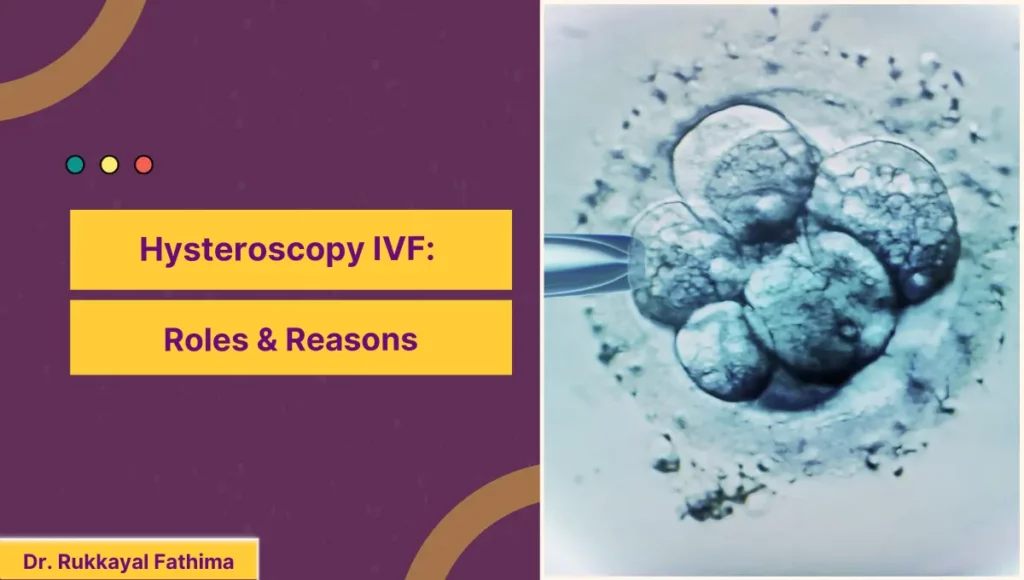IVF is a fertility treatment that has helped several couples with infertility issues become parents. Infertility is a common issue nowadays, and it can be caused due to various issues.
Hysteroscopy is a medical procedure where a device is inserted inside the vagina to view the inside of the uterus and fallopian tubes. This can help doctors diagnose any abnormalities in the uterus and treat them.
Hysteroscopy is an outpatient procedure. You might be given mild anesthesia during the procedure. So you don’t have to worry about pain or other complications.
In this article, we’ll discuss why doctors recommend hysteroscopy before IVF and how it can increase your chances of pregnancy.
Role of Hysteroscopy in IVF
If you have decided to undergo IVF, your doctor may suggest you undergo hysteroscopy. This is to understand the root cause of your infertility and determine the best treatment to rectify the issue.
Undergoing a hysteroscopy before IVF is one of the best ways to check whether your uterus is in optimal condition to Implant the embryo. Doctors can assess uterine receptivity and identify the right time for when the uterus will be ready for implantation.
Hysteroscopy is a necessary treatment to undergo before IVF, especially for women who have been having recurrent miscarriages. This test can help identify why they have been having this issue and prevent it during future cycles.
Reasons for Hysteroscopy to Be Done
A hysteroscopy can be done to view the inside of the uterus and check for any abnormalities. You can check if you have uterine issues like fibroids, polyps, septa, and other abnormalities.
Below are some complications that can be diagnosed by undergoing a hysteroscopy procedure.
Unexplained vaginal bleeding
An abnormal vaginal bleeding is when you have unexplained bleeding after sex or after menopause. It is also considered abnormal if you have heavy and painful bleeding during your menstrual cycles.
It might be caused due to fibroids, polyps, or endometrial abnormalities. Undergoing a hysteroscopy can help you look inside the uterus and identify the cause of the issue.
Infertility
Complications in the fallopian tubes or uterus can be one of the main reasons for your infertility. Doctors often use hysteroscopy to diagnose any issues that might be affecting your ovulation and pregnancy.
Here are some infertility issues that can be diagnosed through a hysteroscopy.
- Identify and resolve issues like uterine fibroids, polyps, or uterine scar tissues.
- Examine the structure of the uterus and identify issues like uterine septum.
- Identify the presence of any chronic infection, inflammation, or tumors.
Recurrent miscarriage
Recurrent miscarriage is a condition where a woman has repeated miscarriages and has difficulty achieving and maintaining pregnancy. These miscarriages might sometimes occur due to uterine disorders.
A hysteroscopy can help women identify any structural abnormalities in their uterus, like fibroids or septum, that may be preventing them from having a successful pregnancy. They might have an increased chance of pregnancy once the issue is treated.
Abnormal pap test
A pap test or pap smear is a test done to examine the cervix, the entrance of your uterus. This test can identify of the cervix is healthy or if it has any complications.
Your doctors will recommend a hysteroscopy if they find anything abnormal with the pap test and wish to examine the uterus.
Pelvic pain
There are many issues that can cause pelvic pain, like endometriosis, adenomyosis, Mullerian anomalies, retained fetal bones, etc. A hysteroscopy can be done to identify these issues and find out the cause of pelvic pain. Hysteroscopy also plays a major part in resolving some of those issues.
IUD placement
As the name suggests, an IUD (intrauterine device) is a contraceptive that is placed inside the uterus to prevent pregnancy. It is one of the best contraceptives that has long-term effects of preventing pregnancy (about 5 to 10 years).
A hysteroscopy can be used to insert the device into the uterus or remove it when you wish to get pregnant. It should also be done before inserting an IUD to prevent any adverse effects on the uterus.
Who Needs a Hysteroscopy?
A hysteroscopy can be undergone by any woman who has abnormal uterine issues. Here are some cases where women might need a hysteroscopy.
- When they have heavy menstrual bleeding
- When they have difficulty getting pregnant
- When they have recurrent miscarriage
- When they need to place or remove IUDs
- When they have unexplained vaginal bleeding
- When they need to diagnose and remove placental tissue after delivery
Likewise, here are some situations when women should NOT undergo hysteroscopy.
- When they have a pelvic infection.
- When they are pregnant.
Conclusion
Hysteroscopy is a useful diagnostic procedure that can help IVF doctors understand the cause of any uterine abnormalities and determine the right treatment procedures.
Undergoing the procedure before an IVF can also help identify any issue beforehand. This reduces the risk of IVF failures and increases the chances of a successful pregnancy.
Yes, hysteroscopy has been found to increase the chances of pregnancy in women to some degree. Uterine abnormalities are most often the cause of IVF failure. Once you identify the issue and treat it, you can potentially increase your chances of IVF success.
Hysteroscopy is an intra-uterine procedure where a thin tube with a camera is inserted into the uterus for examination. It is best to wait for around 90–180 days before undergoing an embryo transfer. This can give your uterus time to recover from the procedure.
Hysteroscopy can be beneficial before IVF, but it is not a compulsory procedure. Doctors only recommend it if they find any anomalies during an ultrasound and want to examine and treat it.
No, hysteroscopy does not interfere with your menstrual cycles. You will get your period as usual. However, some might witness some bleeding, spotting, or irregular periods during the first month after the procedure.





